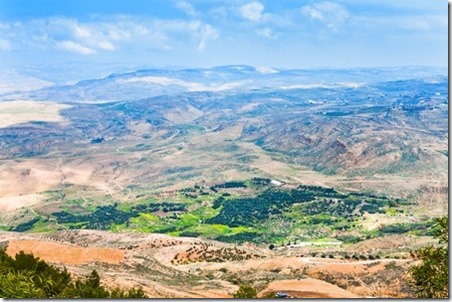 What if your next act of disobedience changes the course of your life? Have you ever considered this? I was reading the passage about the twelve spies and Israel’s rebellion in the book of Deuteronomy, and the profoundness of this passage struck me and has stayed with me since. It made me contemplate this question. I am not talking about losing a blessing as a result of being disobedient; I am talking about a profound change like in the case of those who rebelled, not entering the land. Just think about it, they were saved from harsh slavery just to walk around the wildreness for 40 years. They sure had something to contemplate…
What if your next act of disobedience changes the course of your life? Have you ever considered this? I was reading the passage about the twelve spies and Israel’s rebellion in the book of Deuteronomy, and the profoundness of this passage struck me and has stayed with me since. It made me contemplate this question. I am not talking about losing a blessing as a result of being disobedient; I am talking about a profound change like in the case of those who rebelled, not entering the land. Just think about it, they were saved from harsh slavery just to walk around the wildreness for 40 years. They sure had something to contemplate…
YHVH is very patient with us; I don’t think we realize just how much. Will He always be? Or will His patience with us run out? How often do we justify our disobedience; thinking it does not really matter so much? I have done this; I am sure we all have, but what if the next act of disobedience was the act that would change the direction of my life completely. What if we could look back and see the consequences of every act of disobedience. Would that motivate us to be obedient? What if it’s too late?
You probably noticed that we talk about disobedience and rebellion interchangeably.
Disobedience is rebellion
The resason is because it is the same. Did you know that disobedience is considered as rebellion by YHVH? Let’s look at the Hebrew word “meri” that is translated as rebellion.
5308 מְרִי (merî): n.masc.; ≡ Str 4805; TWOT 1242a—1. LN 39.34–39.41 rebellion, revolt, i.e., an act. or state of disobedience, opposition, or resistance to one in authority (Dt 31:27; 1Sa 15:23; Ne 9:17; Job 23:2; Pr 17:11; Isa 30:9; Eze 2:5, 6, 7, 8; 3:9, 26, 27; 12:2,3, 9, 25; 17:12; 24:3; 44:6+); 2. LN 88.198–88.205 bitterness, i.e., of great mental distress, implying animosity and loathing against another (Job 23:2+); 3. LN 39.34–39.41 unit: בֵּן מְרִי (bēn merî) rebel, formally, son of rebellion, i.e., one in a state of revolt, implying a guilty or sinful state (Nu 17:25[EB 10]+)2
Look carefully at this definition. Rebellion is an act or state of disobedience, opposition or resistance to the one in authority. It is also bitterness; I didn’t know that bitterness is a form of rebellion. So, rebellion is not only an act of disobedience, but also opposition or resistance and bitterness against YHVH. So, when things go wrong, and we grumble and become bitter, we are being rebellious against YHVH.
Rebellion is something YHVH really hates!
1 Samuel 15:23
23 “For rebellion is as the sin of divination, And insubordination is as iniquity and idolatry. Because you have rejected the word of YHVH, He has also rejected you from being king.â€
Keep this in mind as we now proceed to look at a few peoples lives, as described in the Bible , to gain some insight into this.
The twelve spies
We shall first look at the passage about the twelve spies in Deuteronomy 1. Have you ever really contemplated this? It is so profound! It is about how the lack of trust in YHVH, which caused them to rebel against YHVH, changed the direction of people’s lives. They had a choice, in front of them. They had a good report based on trust in YHVH, and they had a bad report, man’s interpretation of the situation, based on fear.
What really happened at Kadesh Barnea was just one too many rebellions against YHVH. He was so patient with them. By this time, they have miraculously been delivered from slavery in Egypt, they have been provided for with water, after murmuring about bitter water. They have been provided manna, after grumbling about not having food. YHVH provided quail, after they complained about not having meat. Then YHVH gave them His Torah, after they said they will obey. However, they broke their promise, made a golden calf and worshiped it. They really did have a stinking attitude, rebelling against YHVH constantly either by murmuring or disobedience.
Up until this point, YHVH was extremely patient with them. However, this incident with the spies was the last straw; this act of rebellion changed their lives forever. The people chose to believe the bad report, and rebelled against YHVH. They knew from experience that YHVH can deliver them, yet they feared and rebelled. Interestingly, after YHVH told them that they would not enter the land, they realized that they sinned against YHVH and wanted to fix it by going up and fight. However, it was too late. YHVH told them He would not help them, yet they rebelled again and proceeded. This is what happened…
Deuteronomy 1:44–45
44 “The Amorites who lived in that hill country came out against you and chased you as bees do, and crushed you from Seir to Hormah. 45 “Then you returned and wept before YHVH; but YHVH did not listen to your voice nor give ear to you.
Then their long journey of forty years in the wilderness began…
We only have a fragment
Don’t we sometimes go through live grumbling about the things that go wrong instead of looking at the big picture? A spiritual picture of YHVH providing for our every need, a picture of His incredible patience and love. YHVH has a plan even if it seems to us that things are going wrong. Things that go wrong can turn out to be a blessing…
“Maybe it’s a blessing or maybe it’s a curse.” This phrase is from an old Jewish Folktale. we have read to our kids many times. It’s about how something may seem a blessing, but isn’t or may seem a curse, but isn’t. A really cute, thought-provoking story. In the end what seemed to be a curse saved a boys life… This tale shows us that we have a partial perspective, a fragment of the whole, and often judge situations based on that.
In our family, this has become a regular saying whenever things don’t go according to our plans; it gives us a more realistic perspective, as we don’t know YHVH’s plans. YHVH’s thoughts are not our thoughts, and His ways are not our ways.
Here is a link to the Max Lucado version of the story if you would like to read it, it’s also very good: http://www.barnabasministry.com/quotes-oldmanwhitehorse.html
Paul also commented on this partial perspective, he said that we only know in part.
1 Corinthians 13:9
9 For we know in part and we prophesy in part;
1 Corinthians 13:12
12 For now we see in a mirror dimly, but then face to face; now I know in part, but then I will know fully just as I also have been fully known.
These things, we consider bad, might be tests that YHVH sends our way to see if we would continue to trust Him. Alternatively, sometimes we face difficulties to build our character. The question is, do we pass the test or fail? Do we build character or grumble?
Israel eventually failed one test too many, and their lives were changed irrevocably. Amazingly, YHVH did not abandon them; He helped them through the forty years, although they never entered the land.
Let’s look at another example.
Moses and Aaron not entering the promised land
Moses and Aaron were the leaders, and YHVH’s spokesmen. Aaron was the high priest and Moses the leader. Israel complained bitterly about not having water to drink. Moses and Aaron were commanded by YHVH to talk to the rock in order for them to have water.
commanded by YHVH to talk to the rock in order for them to have water.
Numbers 20:8
8 “Take the rod; and you and your brother Aaron assemble the congregation and speak to the rock before their eyes, that it may yield its water. You shall thus bring forth water for them out of the rock and let the congregation and their beasts drink.â€
Moses was angry with the people, because of their murmuring, he called them rebels. He did not talk to the rock; he struck it instead, knowing that YHVH commanded him to talk to it.
Numbers 20:10–11
10 and Moses and Aaron gathered the assembly before the rock. And he said to them, “Listen now, you rebels; shall we bring forth water for you out of this rock?†11 Then Moses lifted up his hand and struck the rock twice with his rod; and water came forth abundantly, and the congregation and their beasts drank.
The result of this act was severe. Moses and Aaron were not allowed to enter the promised land. Just think about this, Moses the great leader, the person whom YHVH spoke to as a friend (Ex 33:11, Deut 34:10) was not allowed to enter the land, due to his disobedience.
Numbers 20:12
12 But YHVH said to Moses and Aaron, “Because you have not believed Me, to treat Me as holy in the sight of the sons of Israel, therefore you shall not bring this assembly into the land which I have given them.â€
No amount of pleading changed this (Deut 3:23-26). The course of the lives of Moses and Aaron were changed irrevocably. YHVH does not make any exceptions, instead; the leaders are judged more severely because they have influence over the people, and they represent YHVH before the people. If they do something wrong, it brings YHVH’s name in disgrace. Not only were Moses and Aaron leaders, they were teachers.
Teachers and leaders will incur a stricter judgment.
James 3:1
1 Let not many of you become teachers, my brethren, knowing that as such we will incur a stricter judgment.
We all learn from each other, so in a sense we teach each other. Do we make sure we relay truth to others, or do we just read something and share it as truth with others? We will be held accountable for everything we teach others. When you share something, you have the ability to influence another person, be aware of that as it can be to their benefit or their detriment. Do not just share everything you read, indiscriminately on the Internet or Facebook. Show yourself approved, be a Berean, and make sure what you read line up with Scripture or is truth before sharing it. A good example is this whole “new” teaching on the Enoch calendar. Some do present very convincing proof, but if you were to dig deeper, you would realize that it is deception. We have done some extensive study on the subject, and proved it to be false. You can read the articles on our site.
Be careful as there are people who deceive others with their poor scholarship, or some even do it with the intend to do so. Y’shua said we are to make sure we are not deceived… At the same time we are to make sure we don’t deceive when we share whatever we read without checking it first.
We see a similar pattern of severe judgment when it comes to King Saul and King David.
King Saul
Saul was the first King of Israel and was chosen by YHVH to be king. Saul was commanded by YHVH to strike Amalek and utterly destroy all that he had.
1 Samuel 15:3
3 ‘Now go and strike Amalek and utterly destroy all that he has, and do not spare him; but put to death both man and woman, child and infant, ox and sheep, camel and donkey.’ â€
However, Saul thought it a good idea to keep the king alive and allowed the people to choose the best of the sheep and cattle for YHVH.
1 Samuel 15:9
9 But Saul and the people spared Agag and the best of the sheep, the oxen, the fatlings, the lambs, and all that was good, and were not willing to destroy them utterly; but everything despised and worthless, that they utterly destroyed.
YHVH was not happy with this!
1 Samuel 15:11
11 “I regret that I have made Saul king, for he has turned back from following Me and has not carried out My commands.†And Samuel was distressed and cried out to YHVH all night.
While Samual was distressed about this, Saul didn’t think he did anything wrong…
1 Samuel 15:13
13 Samuel came to Saul, and Saul said to him, “Blessed are you of YHVH! I have carried out the command of YHVH.â€
When Samual confronted Saul he maintained that he didn’t do wrong.
1 Samuel 15:19–21
19 “Why then did you not obey the voice of YHVH, but rushed upon the spoil and did what was evil in the sight of YHVH?†20 Then Saul said to Samuel, “I did obey the voice of YHVH, and went on the mission on which YHVH sent me, and have brought back Agag the king of Amalek, and have utterly destroyed the Amalekites. 21 “But the people took some of the spoil, sheep and oxen, the choicest of the things devoted to destruction, to sacrifice to YHVH your Elohim at Gilgal.â€
Here Saul justifies his disobedience and blamed the people for sparing some the sheep and oxen. He continues by saying that it was for a good purpose, it was to sacrifice to YHVH.
This was not the first time Saul trespassed YHVH’s commandment. On another occation he assumed the priestly office and brought sacrifices when Sanual didn’t arrive on time. Here also, he justified what he did.
1 Samuel 13:11–12
11 But Samuel said, “What have you done?†And Saul said, “Because I saw that the people were scattering from me, and that you did not come within the appointed days, and that the Philistines were assembling at Michmash, 12 therefore I said, ‘Now the Philistines will come down against me at Gilgal, and I have not asked the favor of YHVH.’ So I forced myself and offered the burnt offering.â€
The phrase “so I forced myself and offered a burned offering” proves to us that he knew what he was doing was not right
What do we learn from Saul? Saul was only partially obedient, and justified his disobedience every time. The first time he “had to force himself to do it, the second time he partially blamed the people, though he was the king and was to make sure YHVH’s command was kept. He also justified the disobedience by saying it was done for YHVH. Don’t we justify our disobedience sometimes?
These acts of disobedience changed the course of Saul’s life; he was rejected as king by YHVH and YHVH even sent an evil spirit to enter and torment him. It could have been different…
King David
King David saw a woman bathing and wanted her for himself. He knew it was wrong, for a king was to write his own copy of the Torah. Nevertheless, he organized for her to come to his home, and one thing led to another; her husband was killed in battle (King David organized this too), and he married her.
As a result of this adulterous union, King David’s disobedience to YHVH’s commandments, his life was changed irrevocably. He repented, but still lived with the consequences. Furthermore, King David was a leader; a prominent person and YHVH’s judgment was severe.
Sin changes the direction of our lives; disobedience will alter the course of our way. The consequences remain when we sin. We can get forgiveness, but will have to live with the outcome of that sin. Who knows how different his life might have been, has this not taken place?
King David’s covetousness cost him dearly. The temptation was too great, and he stumbled. What could he have done differently? Think about this…Maybe he entertained the temptation, thinking he would be strong enough to just look… Our next article is about covetousness, please subscribe to make sure you don’t miss it.
YHVH wants us to be obedient to Him, for our own good. He has plans for us, yet we do have free will and has to choose wisely. He feels strongly about disobedience as disobedience is rebellion against Him.
That is probably why the punishment is so severe.
Disobedience brings disaster
Disobedience brings disaster…
1 Samuel 12:15
15 “If you will not listen to the voice of YHVH, but rebel against the command of YHVH, then the hand of YHVH will be against you, as it was against your fathers.
Do you know what it means if the hand of YHVH is against us? We read about this in Leviticus 26 and also in Deuteronomy 28. We will be blessed when we obey, but cursed when we don’t obey.
We are currently, as a believing nation, being cursed for our disobedience. These cycles of curses as described in Leviticus 26 are being experienced by us. You can read more about this in the article “If you will not return to Me… Please read this article, then you too will understand that we are living these cycles of curses. We are currently in the cycle of plagues, which are running concurrently with the curse of terror and the curse of natural disasters. The next curse is war and then comes captivity…It is not too late yet, we can still repent and return to YHVH. The alternative would be experiencing what the people in Syria and Iraq are experiencing. This is serious! Don’t just wave this away as not applicable to you. Start obeying YHVH in everything, your life and the lives of your loved ones may depend on this! This includes the Sabbatical year of 2016. You can read more about this on our site under the category “Appointed times.” We have written why we have to obey this commandment, why it is in 2016 and also a few practical articles on how we are to keep it and the meaning of it all.
Sometimes we lose out on blessings due to our disobedience, and sometimes our entire life might be changed. Is it worth the risk? Every time sin comes knocking at our door, we have a choice. We can resist satan and choose to be obedient to YHVH, or we can go ahead after the lust of our flesh, sin and face the consequences. Not obeying YHVH’s commandments is sin. You can read What does YHVH require of us? to find out what we are to do.
Please don’t take this lightly, who knows, maybe the next time you sin, your life will be changed completely, and you may regret it for the rest of your life. Turn to YHVH, He is our only hope! Repent and live an obedient life. We can do all things through Him who strengthens us!
Philippians 4:13
13 I can do all things through Him who strengthens me.
References
- All quoted passages are from the New American Standard Bible: 1995 Update. LaHabra, CA: The Lockman Foundation, 1995. We have substituted YHVH for LORD and Y’shua for Jesus.
- Swanson, J. (1997). Dictionary of Biblical Languages with Semantic Domains : Hebrew (Old Testament). Oak Harbor: Logos Research Systems, Inc.











Leave a Reply